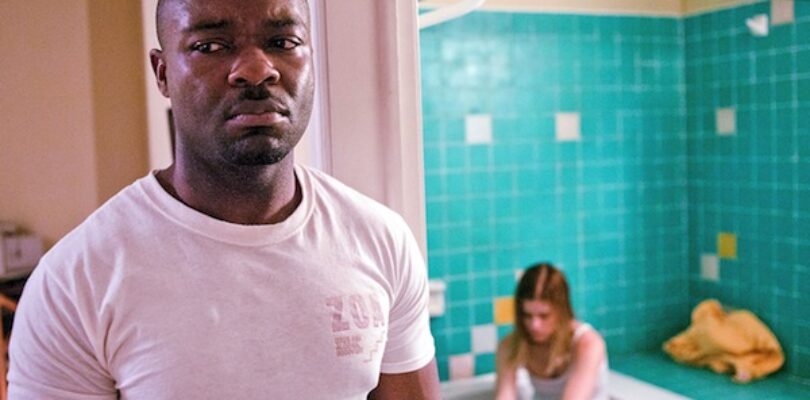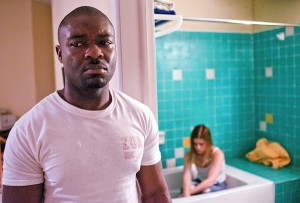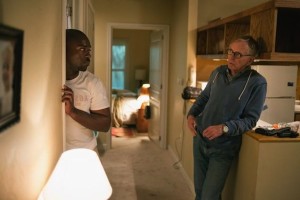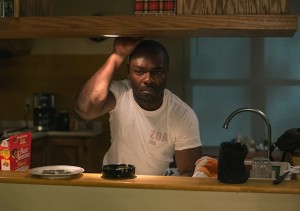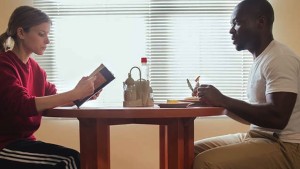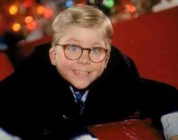In March 2005, Ashley Smith was held hostage in her apartment by Brian Nichols, an escaped killer hell-bent on seeing his newborn son. As Nichols kept Smith captive for seven hours, the pair slowly came to a crossroads between hope and despair. Smith had bonded with Nichols by reading aloud Rick Warren’s best-selling book The Purpose Driven Life.
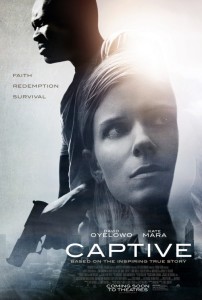 The new film, Captive, based on Smith’s account of the ordeal in her book Unlikely Angel, tells the story of how this one-time meth addict overcame her vices to survive through the worst night of her life and forge a new, productive path for herself. The film features standout performances from Kate Mara as Ashley Smith and David Oyelowo as Brian Nichols.
The new film, Captive, based on Smith’s account of the ordeal in her book Unlikely Angel, tells the story of how this one-time meth addict overcame her vices to survive through the worst night of her life and forge a new, productive path for herself. The film features standout performances from Kate Mara as Ashley Smith and David Oyelowo as Brian Nichols.
Oyelowo burst into the mainstream with his brilliant portrayal of Dr. Martin Luther King, Jr. in Selma (2014). He’s also showcased his considerable talent with turns in such films as Interstellar (2014), Lee Daniels’ The Butler (2013), Jack Reacher (2012), and Lincoln (2012). With Captive, he continues his exploration of life behind the camera as a producer, which he began back in 2009 with the short film Big Guy.
Oyelowo recently spoke with CinemaNerdz, along with the Michigan Times, the Oakland Post, and the Michigan Journal about the making of Captive, working with Kate Mara, the importance of faith, redemption, and second chances. What follows is a transcript of that conversation.
[divider]
Michigan Times: Selma was such a tour de force. As Martin Luther King, Jr., you did really amazing and incredible work. What attracted you to do something so completely different with Captive?
[pullquote_right]Brian Nichols was one of the tougher headspaces I have had to inhabit.[/pullquote_right]DAVID OYELOWO: There were two reasons. One of them you already hit on in terms of how different it is. I’m a big believer in the fact that the way to keep an audience interested in your work is to keep them guessing. There was a very real danger in playing Dr. King of being associated purely with him – there are far worse individuals you could be associated with for the rest of your life – but I didn’t want that to limit the possibilities for me as an actor. So, playing someone like Brian Nichols who is, of course, antithetical to Dr. King was attractive from that point of view. But, for the same reason I was drawn to Selma, I was drawn to Captive. You have [triumph in] both [films] in terms of voting rights in Selma being a huge challenge that needed to be overcome in that film, and was overcome, [and in Captive] you have two people – a meth addict and a murderer – both in a very, very dark place and somehow you have a positive result despite the darkness of what happened on that day. So, I was drawn as a producer and as an actor, more to the story in Captive as opposed to that character. I have to admit that playing Brian Nichols was one of the tougher headspaces I have had to inhabit and I’m not going to be in a hurry to play a guy who kills four people in a day again. But, those were the reasons I gravitated towards the role.
CinemaNerdz: How did you prepare for the role of Brian Nichols?
OYELOWO: Well, the great thing is that Ashley Smith was with us for a lot of the shooting – [she is] the actual lady that Kate Mara plays. She was a huge source of information. She remembers it like it happened yesterday – such a dramatic moment in her life. Her book, Unlikely Angel, was also a very detailed source of what happened on that night. The trial was fairly long so there’s a lot of footage of Brian Nichols to draw on. I did try to meet Brian Nichols, but he’s serving multiple life sentences and there’s just no way to him. Then, studying people who have done this and also talking to a clinical psychologist about someone who can do this mentally. Those are all things I had to look at.
Oakland Post: What was the relationship like between you and Kate Mara? How did the two of you prepare to portray the same between Ashley Smith and Brian Nichols?
OYELOWO: Kate’s one of my best friends in the world. Before we did the film I actually directed her in a short film called Big Guy. So, I’ve known her for a long time and I was a big advocate for her playing this role because I knew that [with] whoever was going to play Ashley, there needed to be a sense of trust between the two of us in order for us to really push it in terms of how dangerous that relationship feels in the beginning and how, as you say, it evolves over what was seven hours on the day. But, over the course of the movie, you need to really believe the evolution of that relationship within the context of the film. And one of the challenges when you’re making movies is that you’re thrown together very quickly, you’re often shooting out of order, and you have to sort of make it all feel like it works. One of the things that can really help with that, is when you work with people you know. I’ve had that with directors. I’ve had that with some other actors as well. It’s what you get in the theater a lot of the time, when you work with a theater company, there’s a trust built. That just means that I think the work can be richer, so that was the nature of my collaboration with Kate on this film.
Michigan Journal: If you had been offered a role other than Brian Nichols, would you have accepted that role?
OYELOWO: You mean if I had been given the choice of doing this and another role?
Michigan Journal: In this film, if you were given maybe the detective role, or something versus….
[pullquote_right]You need to position yourself in places where failure is a real possibility.[/pullquote_right]OYELOWO: It was funny, at the time and in many ways, [at least] on paper, you would probably cast me in the role that Michael K. Williams plays in terms of the detective and have Michael play Brian Nichols. Again, that was one of the things that attracted me to playing Brian, because you wouldn’t expect me to play this guy. Brian was a huge guy. I had to spend quite a bit of time in the gym to sort of assimilate his size and the menace that you should feel when someone like that breaks into your apartment. So, no, that was always the role I was going to be attracted to, primarily because, part of what you’re looking for as an actor is to dare yourself. Can I do this? You need to position yourself in places where failure is a real possibility. Because when that’s the case, that’s when the audience [will] continue coming back for more. Hopefully, anyway, if you succeed, they’re keen to see if you can conquer a myriad of roles. I always feel that about an actor like Christian Bale for instance, or Sean Penn, or Denzel Washington, or Daniel Day-Lewis who, to me, is the absolute epitome of that. There seems like nothing he’s unable to do. So, in aspiring to be in the same hemisphere as those actors, that’s why I would go for a character that isn’t expected of me.
Michigan Times: You’ve worked with some of Hollywood’s greatest directors – Christopher Nolan, Steven Spielberg, Lee Daniels, etc. – how have these directors been able to adapt to your amazing ability as an actor and pull out what they need onset from you on any given day?
OYELOWO: Every one of those directors that you’ve mentioned, and especially the ones who are truly great, I think what they do is they pick actors who they know are going to be able to deliver, and [ones] they know are also going to be able to surprise. Some of those directors you mentioned, they saw things in me that I didn’t even know were there. I mean, Lee Daniels was actually the first director to cast me as Dr. King. He didn’t eventually go on to make [the film], but he cast me in both The Paperboy (2012) and The Butler, in roles that I, again, didn’t necessarily see myself in until he offered them to me. Ava DuVernay is someone I would put in there as well, having done two films with her. A bus driver from South Central Los Angeles and then Martin Luther King, are also not characters that, when you meet me, you’re going to think, okay that guy’s from Compton, he should drive the bus. So, I turn down a lot of work. When I say that, [I mean] I’m literally a bloodhound for directors who work at the top of their field, because to be around that is what enables you to be the best possible actor that you can be. It’s like playing tennis; you are only as good as your opponent. I would much rather play a tiny role for Christopher Nolan than play a gigantic role for a sub par director who’s going to basically cause me to pickup bad habits and give a bad performance. There’s nothing to be gained there. I would much rather have less money and learn about this craft of acting. And that literally happens. Being on that set with Spielberg, for pretty much a day, on Lincoln, and acting opposite my favorite actor of all time – Daniel Day-Lewis – gave me the blueprint of how to play Dr. King. Literally, you saw the level of immersion it takes to play a role like that. You could think, of course it’s only one scene, but those experiences never leave you. Being onset with Christopher Nolan for a day and just seeing the level of detail that goes into everything. He has a handle on everything on that set. Which, to me, as not just an actor, but as a producer, as well, it shows me just the level of work that has to go into making what you hope will be a great film.
CinemaNerdz: Why were you interested in serving as a producer on Captive in addition to acting in it?
OYELOWO: Because it’s the kind of story I wanted to see in the world. So much of being an actor is basically slotting into other people’s visions, and a lot of the time what Hollywood churns out are things that are pretty hollow and subpar, or rehashed again and again and again. You can either complain about it or you can create. One of the best bits of advice I got (and I’m gonna name drop now) [came when] I did a film called Jack Reacher, and Mission:Impossible – Ghost Protocol (2011) had just come out, and I had a moment where Tom Cruise and I were just about to go into a scene and I think “Mission:Impossible had made more money than any of the other films.” I was just like “How have you done it? How have you, for thirty years, been a movie star?” I think that’s unprecedented. Has anyone else been a movie star, like unquestionably a movie star for thirty years? I can’t think of anyone. And he said, “The way you do it, the way I’ve done it, is create, create, create.” He said [while making] Taps (1981), which was his very first film, he went to every department and just watched what every department did. And he said, beyond that film, on every other film I’ve done, I’ve had a hand in it coming to fruition. I took that to heart. I just thought, “wow, that’s how you do it.” And it was the same with Jack Reacher. He was there as a producer and as an actor, making it happen, being the engine. And I admire that so much. It was at that moment which I went, that’s the way to do it. I can’t just be frustrated that there are bad scripts being sent me. I’ve got to try and create the kind of thing I’d want to be in and from that day is when my sort of producing life began.
[pullquote_right]To me the film is about the miracle of the second chance.[/pullquote_right]Oakland Post: I was wondering, what are you hoping people take out of this movie?
OYELOWO: Well, to me the film is about the miracle of the second chance. I think that each and every one of us, no matter how long or short your life has been, we all have done things we regret. We all have made choices that were questionable and we all desire and crave redemption. We all want a second chance. Ashley Smith said to me that, on that day, she was a meth addict, she had lost custody of her daughter, she was on a very real downward spiral and when Brian Nichols broke into her apartment…she felt that this was God’s way of saying enough is enough, you deserve death for all the bad choices you’ve made. And ironically, and unexpectedly for her, it was [also] the moment beyond which she gained life. She never touched that drug again, she regained custody of her daughter, she went on to be remarried and have another two kids, and now speaks to thousands of people through Celebrate Recovery about the struggles she had and the drug that she was captive to. To me, the fact that that came out of this story of this day, really, if she can be given a second chance, then most of us, in terms of the bad choices that we’ve made, can be as well. And that to me is what I hope people get out of the movie and the universal theme in the movie as well.
Michigan Journal: If the film didn’t have such a deep meaning concerning redemption, do you think you still would have been interested in being part of it?
OYELOWO: No. Because I’m not interested in playing someone who is a murderer for the sake of it, I gravitate towards films that are redemptive. I’m a big believer in the fact that the belief that the light can and does overwhelm the darkness and I don’t want to make movies that leave you in a cold, dark space. I really believe in the power of cinema to enrich, to open your eyes, to educate, to instill hope. So, I genuinely wouldn’t be interested in the version of this [film] that glamorizes what Brian Nichols did on that day and I wouldn’t be interested if the story was just one that ended in desolation and despair and no hope, because a lot of what’s going on in our world is that and this was just one of those stories whereby somehow the corner was turned. Look, what Brian Nichols did on that day has left people’s lives ruined in a very real way and I think he’s serving the just punishment for it. But when I look at Ashley Smith, I see a miracle. I really do. My hope is that people look at her and her life and the choices that she’s made beyond this experience and are inspired by it to step into that for themselves.
Michigan Times: This is probably your most sinister role to date; did you lean on other colleagues or on family during production, because this character goes to dark places, exactly what keeps you grounded as an actor?
[pullquote_right]I really believe in the power of cinema to enrich, to open your eyes, to educate, to instill hope.[/pullquote_right]OYELOWO: My faith as a Christian. For sure that was an element of the story that really spoke to me. I had read Pastor Rick Warren’s book (The Purpose Driven Life) before I read this story and found it very inspiring. It’s a book that talks about purpose and what I got from it was God’s purpose for you actually is bigger than your own. That Heavenly Father can see more for you than you can see for yourself and stepping into that is purpose and purpose to me is living a life that nourishes people beyond yourself. That is the ultimate of what we’re here to do I believe and that is absolutely what Ashley Smith has gained from that night and is the life she’s living now. So, for me, as a Christian, that grounds me because the center of my life isn’t what I do. It doesn’t define me. There’s real tension there. Don’t get me wrong because one of the occupational hazards of being an actor is sort of self-obsession. You are your product. You are under so much scrutiny. You guys are here talking not about me being a good lawyer or a good accountant on the basis of what I do being outside of me, you’re talking about me and whether I succeeded in playing Brian Nichols or not. And if I didn’t succeed then I’m the one who’s walking away saying, they don’t like me. That’s going to happen no matter what. Rejection and the subjective nature of an artistic endeavor means that some people are going to like it and some people aren’t and if all of your self-worth is rooted in that you’re in trouble, that’s why a lot of actors are insecure and do crazy things. It’s because they’re in their own head about themselves a lot of the time. I don’t have that to the same degree. I’m also married and I have four kids. Kids will keep it real.
CinemaNerdz: What’s next for you?
OYELOWO: Next for me is a film called A United Kingdom, which is myself and Rosamund Pike in a love story that took place, another true story, in the 1940s. This was the king of Botswana married a white lady in the UK and they were then looking down the barrel of her being a Botswanan queen and Africa wasn’t happy with that, Botswana wasn’t happy with that, [and the] UK wasn’t happy with that. An interracial marriage in the 1940s just after the second world war was a challenging thing for a lot of people to get their heads around so it’s about how their love overcame quite a bit of challenge shall we say.
CinemaNerdz: You had me at yourself and Rosamund Pike. (Everyone laughs.)
[divider]
See David Oyelowo in Captive in theaters on Friday, September 18th!

